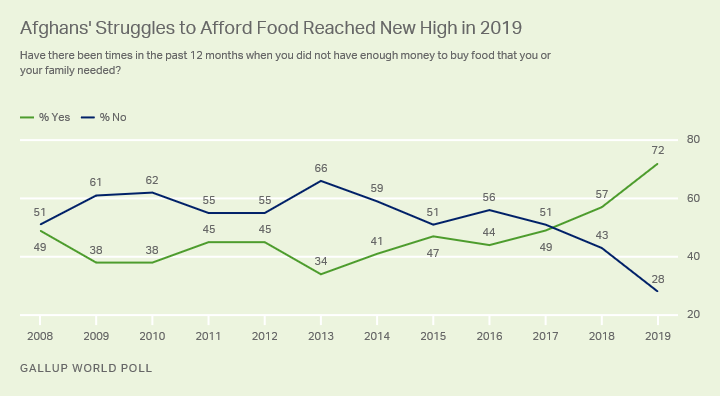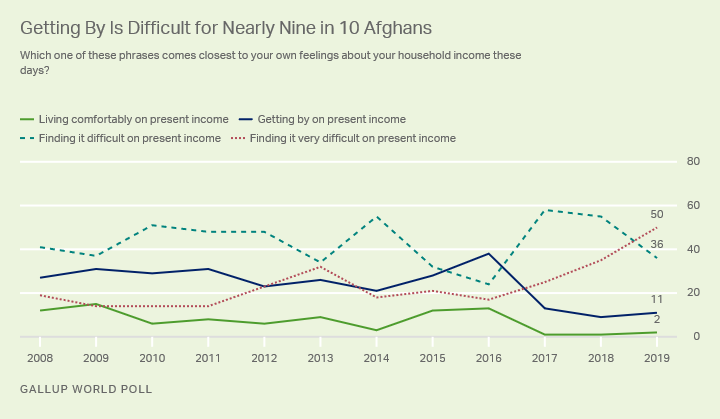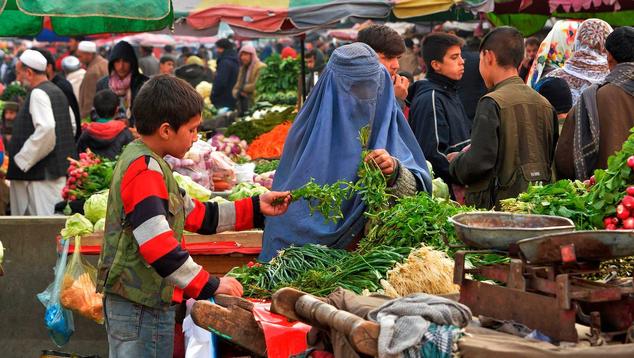Story Highlights
- 72% of Afghans reported lacking money for food in 2019, an all-time high
- Before U.S. withdrawal, Afghans reported more difficulty making ends meet
WASHINGTON, D.C. -- Donor countries pledged more than $1.2 billion last week to ward off an impending humanitarian crisis in Afghanistan, as U.N. Secretary-General Antonio Guterres warned of "the collapse of an entire country." There are concerns that rising hunger and severe drought may compound an already perilous situation in Afghanistan as the Taliban assert control over the national government for the first time since 2001.
Gallup World Poll data in recent years have painted an increasingly difficult economic situation throughout the country as Afghans have struggled to afford even the basics. In November/December 2019, just before the February 2020 signing of the U.S.-Taliban peace deal, more than seven in 10 Afghans (72%) reported that there had been times in the past 12 months when their household lacked enough money for food. This marked a 15-percentage-point increase from 2018 and a new high since Gallup first began measuring this item annually in Afghanistan in 2008.

Line chart. Trend line showing the percentage of Afghans who struggled to afford food. A record 72% in 2019 could not afford food at times for themselves or their families.
After Kabul fell to the Taliban in August, U.N. agencies have warned of disruptions in the distribution of emergency aid, even calling for a "humanitarian airbridge" to be put in place to ensure medicines and hospital supplies are delivered. But while the collapse of the former Afghan government has exacerbated the country's humanitarian crisis in recent weeks, the Food and Agriculture Organization of the United Nations (FAO) has been sounding alarm bells for months, warning of a potential 25% reduction in wheat yields in 2021, a crop that provides half of all caloric intake in the country.
Reflecting Afghans' increased inability to afford food even before the Taliban's takeover, a record-high percentage of Afghans in 2018 (90%) reported that they were finding it either "difficult" or "very difficult" to get by on their household income, a figure that remained at 86% in 2019. In 2019, however, a record-high 50% of Afghans were in the "very difficult" category.
More economic pain may be in store for Afghanistan as a cash-strapped Taliban government asserts control of the country. At least $10 billion of central bank funds remain outside the reach of the country's new authorities, money badly needed to help pay salaries and keep government ministries and programs running. Disruption within the financial system has already reached ordinary Afghans as well, as local banks remain closed -- creating a cash shortage for residents and businesses and a resulting decrease in economic activity at a time of already heightened economic uncertainty.

Line graph. Trend line showing how well Afghans perceive they are getting by on their current household incomes. A record 50% of Afghans found it very difficult to get by on their household incomes in 2019. Eighty-six percent found it difficult or very difficult to do so.
Bottom Line
After 20 years of insurgency, Afghanistan's new Taliban government must now turn its attention to governing. Already among the world's poorest countries, Afghans' economic outlook had taken a turn for the worse in recent years, a situation now further compounded by regional drought, isolation from the world financial system and political uncertainty.
Both Afghans and the world wait to see if the Taliban's assurances of moderation on many issues will come to pass or if the new regime will behave similarly to its last time in power from 1996 to 2001. Humanitarian pledges from the international community show a continued commitment to the people of Afghanistan and a willingness to engage, even if not recognize, Afghanistan's new rulers.
Recent developments in Afghanistan have increased the vulnerability of many Afghans who had already struggled for the basics of survival. The likelihood of a reduced wheat harvest this year in the face of severe drought threatens to push the country toward famine just as the Taliban takes the helm of the country's ministries. The Taliban's willingness to work alongside international aid agencies to address the impending food crisis poses an early test of the new government's ability to meet the needs of its population and gain a degree of acceptance among nations. While the Taliban has proven its staying power as an insurgent force, it may yet find that it was easier fighting people than feeding them.
Watch the video to view more Gallup trends from our past surveys in Afghanistan, and keep visiting news.gallup.com for updates on our surveys in Afghanistan since the Taliban's takeover.
To stay up to date with the latest Gallup News insights and updates, follow us on Twitter.
For complete methodology and specific survey dates, please review Gallup's Country Data Set details.
Learn more about how the Gallup World Poll works.




